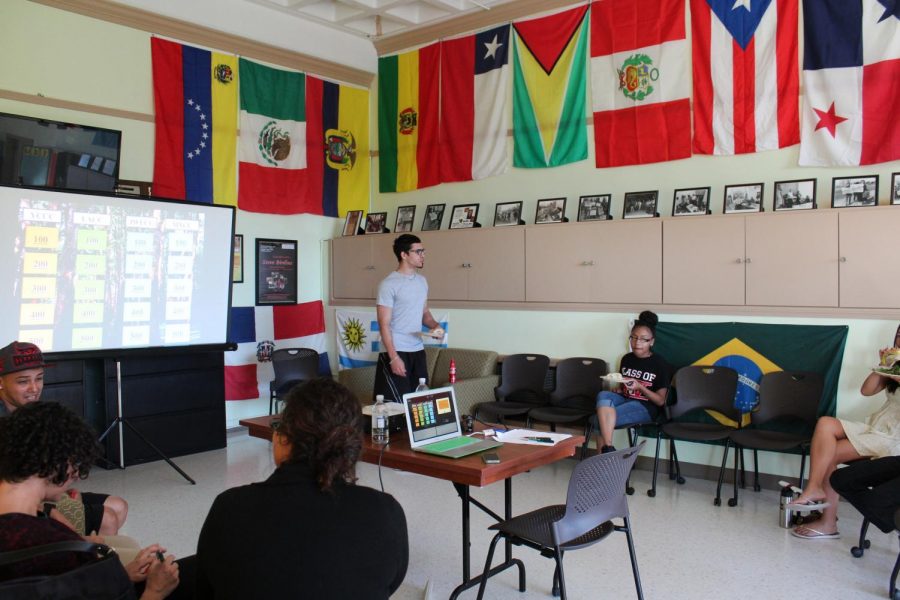The University of Massachusetts Center for Latin American, Caribbean and Latino Studies and the UMass Civic Engagement and Service Learning and Department of Communication co-sponsored the panel, “Civil Engagement in Diverse Latinx Communities: Learning from Social Justice Partnerships in Action” on Friday. Local community members, faculty, staff, city council members and students attended the symposium inspired by the book by UMass professors Mari Castañeda and Joseph Krupczynski.
Castañeda brought up the history of UMass and the local area, citing the need to acknowledge “ancestors whose shoulders our lives are built upon.”
Castañeda discussed the impact of Hurricane Maria and the separated families at the U.S.-Mexican border, and how both of these events continue to have a direct impact on families in and around the Pioneer Valley.
The first panel highlighted a partnership between the UMass College of Education and Holyoke Public Schools ethnic studies program. The panel included Dana Altshuler, a Holyoke Public School ethnic studies coordinator, Joel Arce, a doctoral student in education, Laura Valdiviezo, an associate professor at the UMass College of Education and the Director of UMass Center for Latin American, Caribbean and Latino Studies, Gloria Penagos, a migrant program coordinator at Holyoke-Chicopee-Springfield Head Start Inc and Raul D. Gutierrez, an assistant professor of Latinx Studies and Spanish at Holyoke Community College.
Altshuler opened the first panel by discussing her work with incorporating ethnic studies into Holyoke Public Schools curriculums.
“Through this transformative work, I had seen firsthand students engaging with an ethnic studies curriculum that centered their identities, communities and experiences,” said Altshuler.
Ortega-Bustamante, director of development for the Collaborative for Educational Services, said that the attention throughout the panels to the idea of “the construction of knowledge” really stood out to her.
“As much as the academics are constructing knowledge based on partnerships and research about progress in communities, at the same time it’s the community making meaning by its actions and reactions, and through its resistance to oppression,” said Ortega-Bustamante.
The second panel was titled “Politics of Place: Belonging and Place-Keeping in Holyoke, MA” and included Maria Salgado-Cartagena, a local historian of Holyoke’s Puerto Rican diaspora; Nelson Rafael Roman, Executive Director at Nueva Esperanza and Ward Two Holyoke City Councilor; Vanessa Rosa, assistant professor of Latina/o Studies at Mount Holyoke College and Joseph Krupczynski, associate professor in the Department of Achitecture at UMass.
This panel presented efforts to support “community-driven revitalization” in Holyoke and efforts to protect against gentrification and the development of “place-keeping” projects for the Puerto Rican community in Holyoke.
Roman talked about the work that Nueva Esperanza is doing to create an “anti-thesis or a hub saying ‘our community has space,’” said Roman.
Roman discussed the creation of a gentrification task force with the help of the university institutions to create a report following the gentrification of Holyoke.
A workshop following the second panel called “Student Bridges: Youth-Centered and Asset-Based Approaches to Community Engagement” examined the role of youth participants in community partner cities, and as participants of social change within communities.
Salgado-Cartagena, who has been coordinating Holyoke Bound, a program introducing students, staff and faculty members from Five Colleges to Holyoke since 2011, said that something she wants to focus on is “having students understand that they cannot come to Holyoke and think that they’re going to save anybody. That it’s really about reciprocity, and it’s about what the little things are that you can do for an organization to help them move their mission forward.”
The third panel was “Hurricane Maria, One Year Later: Challenges and Impacts in Western Massachusetts” which included Vanessa Pabon, community engagement director and executive producer of Presencia WGBY, Castañeda; Tara Parrish, executive director of the Pioneer Valley Project, Emily Rodriguez, organizer for the Pioneer Valley Project and Jen Sandler, a lecturer in the UMass Department of Anthropology and director for UMass Alliance for Community Transformation.
The panelists discussed the lasting impact of the hurricane on communities in the valley and around the country. The panelists also discussed efforts for recovery, including a recent effort bringing impacted Puerto Rican families to D.C. to talk to lawmakers and politicians.
“One thing that is important is bringing Hurricane Maria and this crisis to the forefront of culture,” said Phoenix Rios, a junior theatre major at UMass. “It is only talked about in the context of what Donald Trump is doing and saying, not what is actually happening and the actual impact that is continuing. We need to get people talking about this.”
Claire Healy can be reached at [email protected].



















